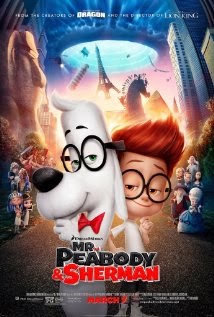Wes Anderson's
The Grand Budapest Hotel is very much like a multi-layered pastry, both visually and story-wise. It's concocted with both sweetness and tartness, as well as a constant swirl of melancholy and tragedy that is difficult to avoid.
The story is told as a flashback within a flashback through multiple narrators. It revolves around Gustave H (Ralph Fiennes), the eccentric hotel concierge, and Zero Moustafa (Tony Revolori), the new deadpan Lobby Boy, whom Gustave takes under his wing. Controversy ensues when Madame D. (Tilda Swinton in amazing make-up), an extraordinarily rich and dear friend of Gustave, passes away. Two different wills surface, causing a battle for her fortune. Gustave is accused of murder, he and Zero steal a priceless painting from her estate, and all hell breaks loose.
The Grand Budapest Hotel is set in a fictional universe that parallels 1930s Europe during the brink of war. These elements of fascism and violence weave their way in and out of the narrative, invading the film's bright exterior. And Zero's sad back-story is revealed later on.
It's pretty incredible how meticulously detailed and finely wrought the film is--from the set designs, the timely movements of the characters, and the precise framing. The shot setups are boxy, whether it be an elevator, a jail cell, a phone booth, or a confession booth. These box shots reflect the stories-inside-of-stories aspect and it's just a sleek compositional look in general. The whip pans and zoom-ins navigate these spaces with deep focus, and the crafted miniatures add a great sense of intimacy. The Starbursts-like color palette is eye-popping, in the way that the colors clash from an interior design standpoint, but you wouldn't mind grabbing a handful and shoving it into your mouth. All of this makes
The Grand Budapest Hotel the most technically Wes Anderson-y Wes Anderson film to date, and I haven't even mentioned the stop-motion ski chase scene yet.
The cast is huge. Aside from the aforementioned, there's Jude Law, F. Murray Abraham, Saoirse Ronan, Jason Schwartzman, Jeff Goldblum, Edward Norton, Adrien Brody, Willem Dafoe, Owen Wilson, and Bill Murray. Everyone greatly matches their characters. Some roles are just tiny, but this keeps it from feeling overloaded. But of course, Ralph Fiennes is the show-stealer, and rightfully so. In this role, he's charming and complex, sophisticated and hilarious, and his line deliveries are on-point.
Wes Anderson's screenplay is terrific. There are some tremendous lines of dialoge, and the jokes whizz by and pile on before you have the chance to chuckle at the first. But the film's most memorable, weighty, and embodying line comes from Gustave during one of the more serious moments: “You see? There are glimpses of decency in this slaughterhouse that we used to call humanity, and what we aim to provide in our simple, humble, dignified… oh, fuck it.”
8.5/10








